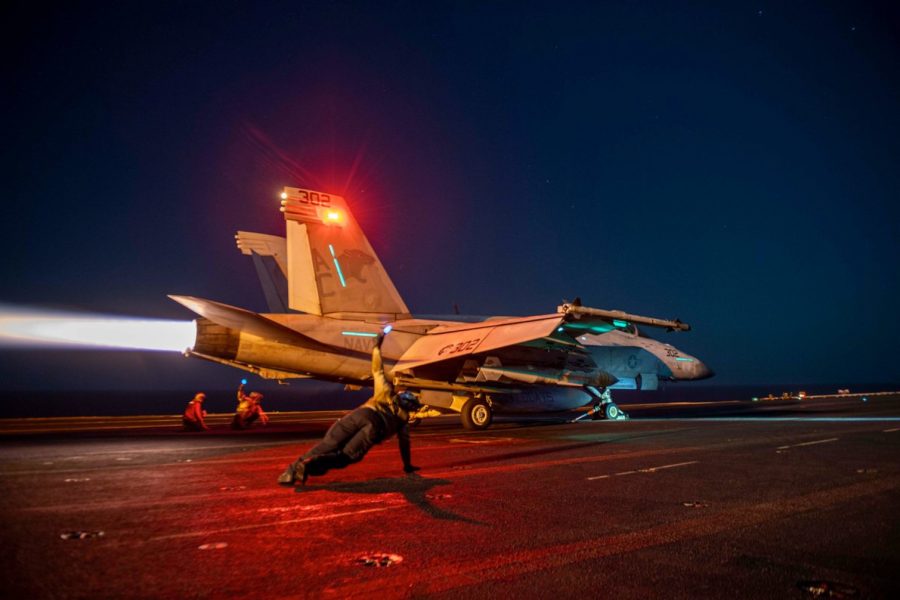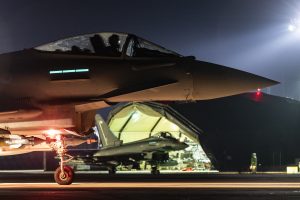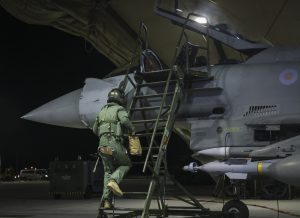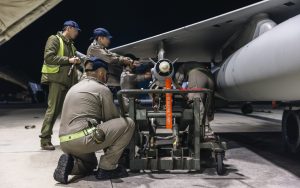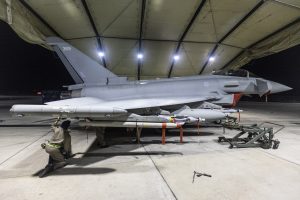American and British forces carried out a series of airstrikes to weaken the Houthis’ military capabilities on Feb. 24, attacking 18 targets at eight locations in response to the group’s latest attacks on commercial shipping off the coast of Yemen, the Pentagon said.
It was the fourth wave of “necessary and proportionate” strikes against Houthi military installations since January, not counting numerous self-defense strikes that have sought to blunt the Iran-backed rebels.
The Pentagon said that the strikes were aimed at “Houthi underground weapons storage facilities, missile storage facilities, one-way attack unmanned aerial systems, air defense systems, radars, and a helicopter.”
The strikes were carried out by U.S. Navy aircraft flying from the aircraft carrier USS Dwight D. Eisenhower and Royal Air Force aircraft, according to U.S. officials.
The British Ministry of Defense said that four RAF Typhoons participated in the mission along with two Voyager refueling tankers. The RAF jets took off from RAF Akrotiri, the U.K. air base in Cyprus.
“Intelligence analysis had successfully identified several very long-range drones, used by the Houthis for both reconnaissance and attack missions, at a former surface-to-air missile battery site several miles northeast of Sanaa,” the U.K. MOD said in a statement. “Our aircraft used Paveway IV precision-guided bombs against the drones and their launchers, notwithstanding the Houthis’ use of the old missile battery revetments to try to protect the drones.”
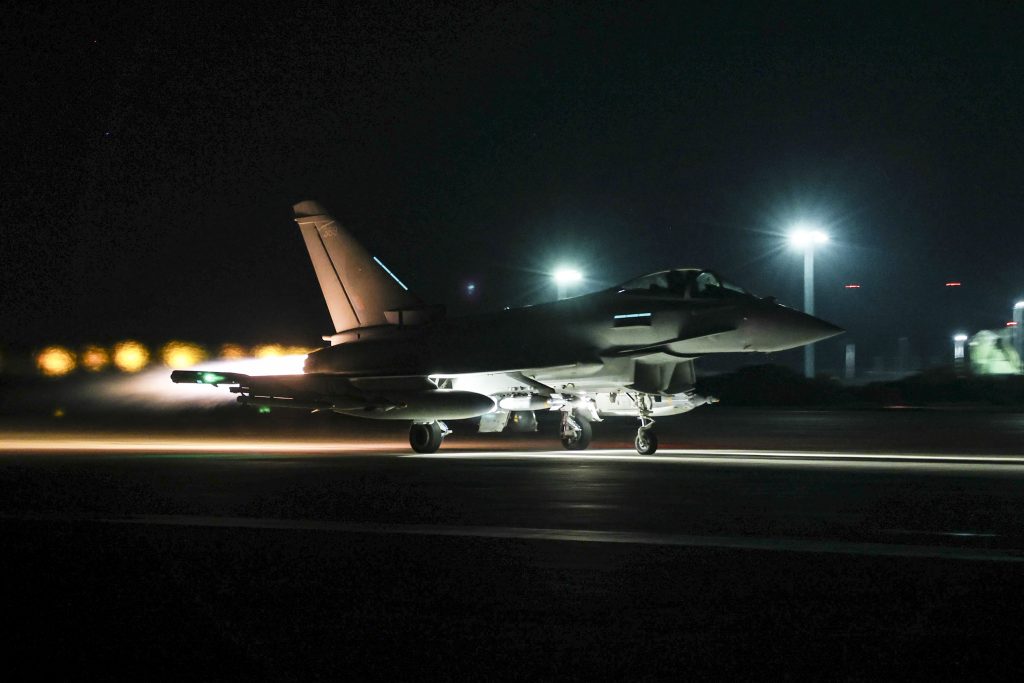
U.S. officials did not provide a battle damage assessment, but Secretary of Defense Lloyd J. Austin III said in a statement that the mission aimed to “further disrupt and degrade the capabilities” of the Houthis to attack U.S. and international vessels in the Red Sea, the Bab al-Mandeb Strait, and the Gulf of Aden.
“The United States will not hesitate to take action, as needed, to defend lives and the free flow of commerce in one of the world’s most critical waterways,” Austin said.
Australia, Bahrain, Canada, Denmark, the Netherlands, and New Zealand provided support for the U.S. and British operation, their governments said in a joint statement, without specifying the nature of the assistance.
“These strikes are in response to Houthis’ continued attacks against commercial and naval vessels that have not only endangered international seafarers but the lives of the Yemeni people,” the joint statement said.
The Houthis have launched a persistent series of attacks against international vessels, including hits on U.S. and British-owned ships in recent days. A Feb. 18 missile launched by the Houthis struck the British-owned M/V Rubymar, which forced the crew to abandon the ship. U.S. Central Command said on Feb. 23 that the ship was carrying 41,000 tons of fertilizer and the attack had created an 18-mile-long oil slick that now threatens to become an environmental disaster.
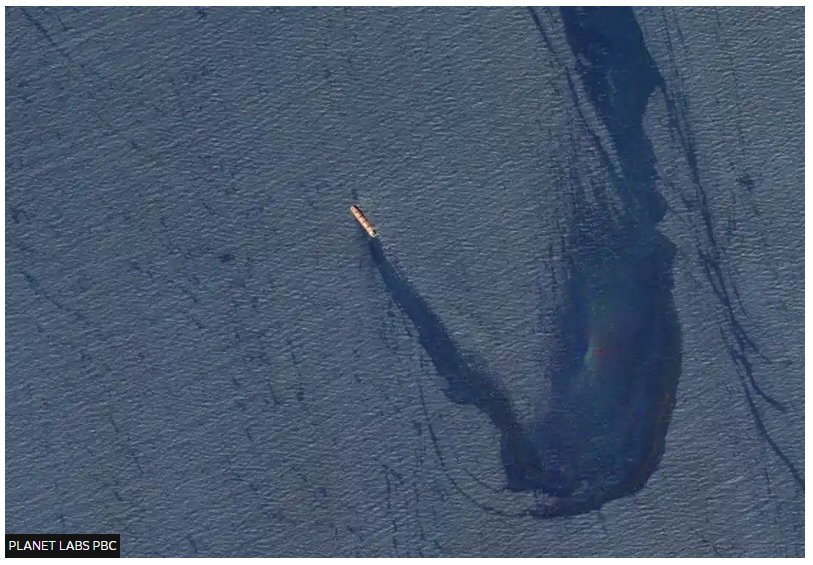
A Feb. 19 Houthi one-way drone attack struck the U.S.-owned Navis Fortuna, and another missile attack that day nearly hit the American-owned M/V Sea Champion, which was on its way to deliver humanitarian aid to Yemen. A Feb. 22 missile attack struck the British-owned M/V Islander and injured a crewmember.
The Houthis have also claimed to have shot down two Air Force MQ-9 drones over the past three months.
“The Houthis’ now more than 45 attacks on commercial and naval vessels since mid-November constitute a threat to the global economy, as well as regional security and stability, and demand an international response,” the joint statement said.
Iranian-backed militia across the Middle East began lashing out after Hamas attacked Israeli civilians on Oct. 7, killing some 1,200 people. Israel’s fierce response in Gaza has emboldened the rebels, particularly the Houthis, which are armed by Iran and part of Tehran’s so-called Axis of Resistance, which also includes Hezbollah in Lebanon, Hamas in Gaza, and militias in Syria and Iraq.
U.S. troops in Iraq, Syria, and Jordan have been attacked more than 165 times since Oct. 17. The U.S. has responded with a series of airstrikes, including one that struck 85 targets in Iraq and Syria earlier this month after three troops were killed in Jordan.
The Biden administration says it is trying to avoid a wider war in the region, acting only when necessary to protect U.S. and allies’ troops and international commerce.
“We will continue to make clear to the Houthis that they will bear the consequences if they do not stop their illegal attacks, which harm Middle Eastern economies, cause environmental damage, and disrupt the delivery of humanitarian aid to Yemen and other countries,” Austin said.
